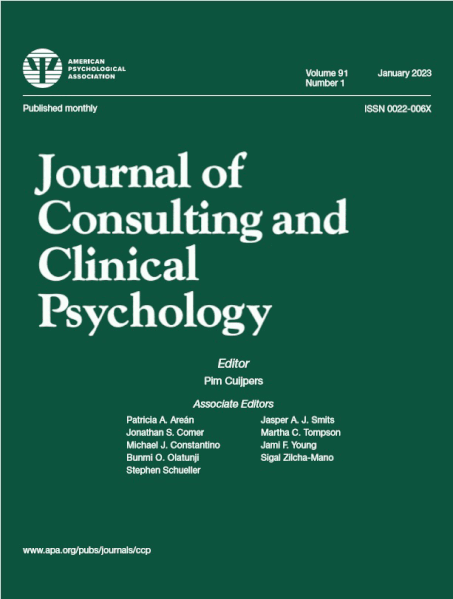Results of a randomized waitlist-controlled trial of online cognitive behavioral sex therapy and online mindfulness-based sex therapy for hypoactive sexual desire dysfunction in women.
IF 5
1区 心理学
Q1 PSYCHOLOGY, CLINICAL
引用次数: 0
Abstract
OBJECTIVE This study aimed to investigate the efficacy of two internet-delivered psychological treatments for hypoactive sexual desire dysfunction (HSDD) in women: internet-based cognitive behavioral sex therapy (iCBST) and internet-based mindfulness-based sex therapy (iMBST). METHOD Women with HSDD were randomly assigned to one of three groups: iCBST, iMBST, or a waitlist control group. The interventions consisted of eight modules delivered via an e-health platform with e-coach support to enhance adherence. Sexual desire and sexual distress were assessed at baseline and at 3-, 6-, and 12-month follow-ups (active conditions only). Per protocol, of the 266 consenting women, 106 were randomized to iCBST (Mage = 36.1, SD = 10.3), 106 to iMBST (Mage = 36.4, SD = 0.2), and 54 to the control condition (Mage = 36.7, SD = 11.0). Primary analyses utilized an intention-to-treat approach with linear mixed models. Clinical significance, assessed with clinical cutoffs and the reliable change index, was examined for active conditions. RESULTS Compared to the control condition, both iCBST and iMBST demonstrated significant improvements in sexual desire and sexual distress at 3-month (d = 0.89-1.14) and 6-month follow-up (d = 0.74-1.18). Results were sustained at 12-month follow-up, with 35 and 41% demonstrating reliable improvements and additional 20 and 24% achieving clinically significant improvements in sexual desire after iCBST and iMBST. Regarding sexual distress, 49 and 42% exhibited reliable change, with an additional 37%-42% achieving clinically significant improvements. CONCLUSIONS Results provide support for the overall long-term efficacy of psychological therapies in treating HSDD in women. However, fewer than one in four women showed improvements in sexual desire that met the threshold for clinically significant change. (PsycInfo Database Record (c) 2024 APA, all rights reserved).在线认知行为性疗法和在线正念性疗法治疗女性性欲减退功能障碍的随机候选对照试验结果。
目的本研究旨在调查两种通过互联网提供的女性性欲减退(HSDD)心理治疗方法的疗效:基于互联网的认知行为性治疗(iCBST)和基于互联网的正念性治疗(iMBST)。方法患有 HSDD 的女性被随机分配到三组中的一组:iCBST、iMBST 或候补对照组。干预措施包括通过电子健康平台提供的八个模块,并配有电子教练支持,以提高依从性。在基线以及 3 个月、6 个月和 12 个月的随访中对性欲和性困扰进行了评估(仅限于活动状态)。根据方案,在 266 名同意接受治疗的女性中,106 人随机接受了 iCBST 治疗(Mage = 36.1,SD = 10.3),106 人接受了 iMBST 治疗(Mage = 36.4,SD = 0.2),54 人接受了对照治疗(Mage = 36.7,SD = 11.0)。主要分析采用线性混合模型的意向治疗方法。结果与对照组相比,iCBST 和 iMBST 均在 3 个月(d = 0.89-1.14)和 6 个月随访(d = 0.74-1.18)时显著改善了性欲和性困扰。iCBST 和 iMBST 治疗后,分别有 35% 和 41% 的患者在性欲方面得到了可靠的改善,另有 20% 和 24% 的患者在性欲方面得到了临床意义上的改善。在性困扰方面,分别有 49% 和 42% 的人表现出可靠的变化,另有 37%-42% 的人获得了临床显著改善。然而,只有不到四分之一的女性在性欲方面有所改善,达到了临床显著变化的临界值。(PsycInfo Database Record (c) 2024 APA,保留所有权利)。
本文章由计算机程序翻译,如有差异,请以英文原文为准。
求助全文
约1分钟内获得全文
求助全文
来源期刊

Journal of consulting and clinical psychology
PSYCHOLOGY, CLINICAL-
CiteScore
9.00
自引率
3.40%
发文量
94
期刊介绍:
The Journal of Consulting and Clinical Psychology® (JCCP) publishes original contributions on the following topics: the development, validity, and use of techniques of diagnosis and treatment of disordered behaviorstudies of a variety of populations that have clinical interest, including but not limited to medical patients, ethnic minorities, persons with serious mental illness, and community samplesstudies that have a cross-cultural or demographic focus and are of interest for treating behavior disordersstudies of personality and of its assessment and development where these have a clear bearing on problems of clinical dysfunction and treatmentstudies of gender, ethnicity, or sexual orientation that have a clear bearing on diagnosis, assessment, and treatmentstudies of psychosocial aspects of health behaviors. Studies that focus on populations that fall anywhere within the lifespan are considered. JCCP welcomes submissions on treatment and prevention in all areas of clinical and clinical–health psychology and especially on topics that appeal to a broad clinical–scientist and practitioner audience. JCCP encourages the submission of theory–based interventions, studies that investigate mechanisms of change, and studies of the effectiveness of treatments in real-world settings. JCCP recommends that authors of clinical trials pre-register their studies with an appropriate clinical trial registry (e.g., ClinicalTrials.gov, ClinicalTrialsRegister.eu) though both registered and unregistered trials will continue to be considered at this time.
 求助内容:
求助内容: 应助结果提醒方式:
应助结果提醒方式:


